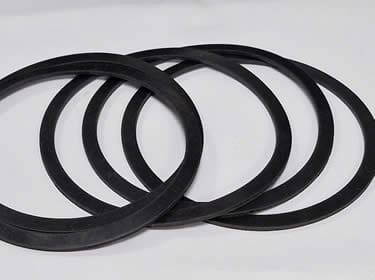NBR Gaskets


NBR Gaskets: Everything You Need to Know
Call 0121 544 5808 Today
Bespoke Manufacturing
Instant Quote Service
Worldwide Delivery
Various Gauges/Thicknesses
Bespoke Manufacturing
Instant Quote Service
Worldwide Delivery
Various Gauges/Thicknesses
What is an NBR (Nitrile Butadiene Rubber) Gasket?
Known for their excellent resistance to oils, fuels, and chemicals, these Gaskets are widely used in industries requiring strong, durable seals in environments exposed to petroleum-based fluids.
Key Characteristics:
- Oil and Fuel Resistance: These Gaskets can withstand prolonged exposure to oils, fuels, and greases, making them ideal for automotive, oil, and gas applications.
- Temperature Range: Functional in temperatures from -40°C to 120°C (-40°F to 248°F), offering versatility across industries.
- Mechanical Strength: NBR Gaskets boast excellent abrasion and tear resistance, suitable for high-stress applications.
- Chemical Compatibility: They offer resistance to many chemicals, enhancing their versatility in various environments.
These Gaskets are especially valued in industries where exposure to oils and chemicals is frequent, providing reliable and durable sealing solutions.
Benefits of NBR Gaskets for Buyers
These Gaskets provide several advantages, making them a practical choice for buyers in industries dealing with oils, fuels, and chemicals. Some of the key benefits include:
1. Oil and Fuel Resistance:
These Gaskets excel in environments exposed to petroleum-based fluids, providing long-lasting sealing in automotive, aerospace, and industrial applications.
2. Wide Temperature Range:
They perform reliably in temperatures from -40°C to 120°C, ensuring flexibility across different applications.
3. Cost-Effectiveness:
These Gaskets offer high performance at an affordable cost, making them ideal for large-scale projects.
4. Durability:
These Gaskets are known for their resistance to wear, tear, and abrasion, providing long service life.
5. Chemical Resistance:
Suitable for environments exposed to hydraulic fluids, solvents, and oils, ensuring reliable performance.
6. Customisability:
Available in various shapes and sizes, these gaskets can be customised for specific requirements.
7. Mechanical Strength:
These Gaskets offer high tensile strength and flexibility, making them effective in dynamic applications.
8. Water and Air Tightness:
They resist water and air permeability, making them perfect for fluid-handling systems.
9. Vibration Dampening:
These Gaskets help reduce noise and absorb shocks in machinery and engines, improving operational performance.
10. Versatility:
They serve a wide range of industries, from automotive to food processing, making them an adaptable solution.
Applications of NBR Gaskets
NBR Gaskets are incredibly versatile, finding use across various sectors where resistance to oils, fuels, and chemicals is essential.
Common Challenges of NBR Gaskets
While these gaskets offer many benefits, they also have limitations that should be considered:
- Temperature Range Limitations:
NBR Gaskets may not perform well in extremely high or low temperatures, limiting their use in environments beyond -40°C to 120°C. - Ozone and UV Sensitivity:
NBR is prone to degradation when exposed to UV light or ozone, making it less suitable for outdoor applications without protective coatings. - Chemical Compatibility:
NBR Gaskets may not be resistant to certain harsh chemicals, such as strong acids, ketones, or solvents like acetone. - Pressure Handling:
In high-pressure systems, NBR Gaskets may compress or deform over time, especially in extreme conditions. - Swelling in Some Fluids:
NBR can absorb certain fluids, leading to swelling, which may compromise the Gasket’s ability to maintain a tight seal. - Low Flexibility at Low Temperatures:
At extremely low temperatures, NBR can become brittle and lose its flexibility. - Electrical Insulation:
These Gaskets have limited electrical insulation properties, making them unsuitable for applications where dielectric strength is required. - Ageing and Deterioration:
Over time, NBR can harden and lose its sealing effectiveness, especially in extreme environments.
Industry-Specific Materials for Gaskets
Different industries use a variety of materials based on their specific operational demands.
These include:
- Automotive: NBR, EPDM, Viton® for oil and fuel systems.
- Oil and Gas: NBR, PTFE, and metallic Gaskets for pipelines and valves.
- Aerospace: Viton®, silicone, and PTFE for fuel and hydraulic systems.
- Chemical Processing: PTFE and Viton®, for aggressive chemicals.
- Food & Beverage: Food-grade NBR, silicone, and EPDM for processing machinery.
- Water Treatment: EPDM and NBR for hydraulic systems in treatment plants.
FAQs About NBR Gaskets
What are NBR Gaskets used for?
Can NBR Gaskets handle high temperatures?
Are NBR Gaskets customisable?
Conclusion
NBR Gaskets are an essential solution for sealing applications across industries like automotive, oil and gas, aerospace, and industrial machinery, where resistance to oils, fuels, and chemicals is critical. Offering a wide range of benefits such as durability, cost-effectiveness, and versatility, NBR Gaskets are a reliable choice for buyers looking to ensure long-lasting performance in tough environments.
At Stephens Gaskets, we specialise in providing high-quality NBR Gaskets tailored to meet the specific needs of your industry. Our Gaskets are customizable, affordable, and designed to deliver exceptional performance.
